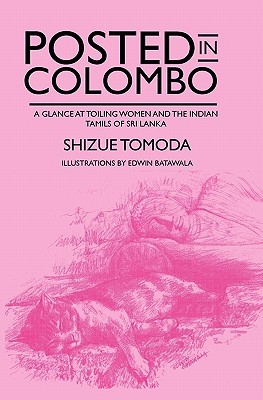
- We will send in 10–14 business days.
- Author: Shizue Tomoda
- Publisher: CreateSpace Independent Publishing Platform
- Year: 2010
- Pages: 314
- ISBN-10: 1453634983
- ISBN-13: 9781453634981
- Format: 13.3 x 20.3 x 1.7 cm, softcover
- Language: English
- SAVE -10% with code: EXTRA
Reviews
Description
A fascinating memoir that deciphers the tragic civil war in Sri Lanka as well as the complex ethnic composition of Sri Lankan society, Posted in Colombo by Shizue Tomoda, a former director of ILO's Colombo Office, is a story of pain, toils, agony, and light. It addresses social and labor issues of vulnerable women workers, such as garment workers and those employed as housemaids in the Middle East, as well as the miserable plight of Indian Tamils of Sri Lanka. Against the backdrop of women workers struggling to escape from poverty, Tomoda sheds light on how such workers can be lifted out of despair by helping them become more self-confident, which would enable them to have more positive outlook and modest aspiration in life. Tomoda shows that this slow but steady transformation of such workers becoming empowered and taking an increasingly greater role in society is a key to socioeconomic development. While women in garment, migrant, and plantation sectors earn a mere pittance, these sectors are the three most important sources of foreign exchange for Sri Lanka. Nevertheless, they receive little recognition for sustaining their families and communities and contributing to the national economy. There's also the distinction between Sri Lankan Tamils and Indian Tamils of Sri Lanka. The former are natives of the island who held senior civil service posts in the colonial administration; the latter had been brought to the island from South India as indentured laborers during the colonial period to work on the plantations in central highlands. This group had little access to education and opportunities, and has thus remained in the same areas and in poverty for generations. In twenty-five engaging chapters in the book, Tomoda examines the struggles of Sri Lanka. More than an informative exposé on Sri Lankan history, labor, ethnic, and gender issues, Tomoda gives readers a portrait of what it means that hope and possibilities are inalienable human rights.
EXTRA 10 % discount with code: EXTRA
The promotion ends in 18d.12:27:39
The discount code is valid when purchasing from 10 €. Discounts do not stack.
- Author: Shizue Tomoda
- Publisher: CreateSpace Independent Publishing Platform
- Year: 2010
- Pages: 314
- ISBN-10: 1453634983
- ISBN-13: 9781453634981
- Format: 13.3 x 20.3 x 1.7 cm, softcover
- Language: English English
A fascinating memoir that deciphers the tragic civil war in Sri Lanka as well as the complex ethnic composition of Sri Lankan society, Posted in Colombo by Shizue Tomoda, a former director of ILO's Colombo Office, is a story of pain, toils, agony, and light. It addresses social and labor issues of vulnerable women workers, such as garment workers and those employed as housemaids in the Middle East, as well as the miserable plight of Indian Tamils of Sri Lanka. Against the backdrop of women workers struggling to escape from poverty, Tomoda sheds light on how such workers can be lifted out of despair by helping them become more self-confident, which would enable them to have more positive outlook and modest aspiration in life. Tomoda shows that this slow but steady transformation of such workers becoming empowered and taking an increasingly greater role in society is a key to socioeconomic development. While women in garment, migrant, and plantation sectors earn a mere pittance, these sectors are the three most important sources of foreign exchange for Sri Lanka. Nevertheless, they receive little recognition for sustaining their families and communities and contributing to the national economy. There's also the distinction between Sri Lankan Tamils and Indian Tamils of Sri Lanka. The former are natives of the island who held senior civil service posts in the colonial administration; the latter had been brought to the island from South India as indentured laborers during the colonial period to work on the plantations in central highlands. This group had little access to education and opportunities, and has thus remained in the same areas and in poverty for generations. In twenty-five engaging chapters in the book, Tomoda examines the struggles of Sri Lanka. More than an informative exposé on Sri Lankan history, labor, ethnic, and gender issues, Tomoda gives readers a portrait of what it means that hope and possibilities are inalienable human rights.


Reviews